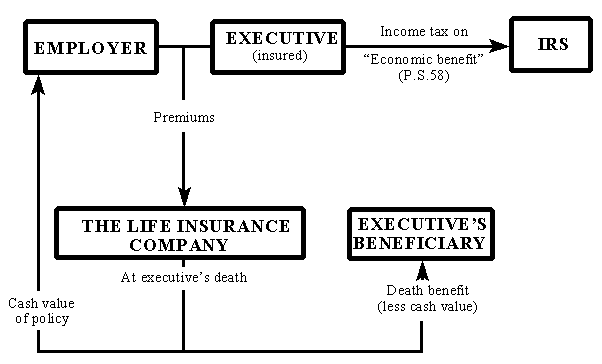Split-Dollar Insurance Plan
A split-dollar plan can provide insurance on the life of an employee (or his or her spouse) at a reduced cost to that individual. The premium for the insurance is shared by the employee and his or her employer.
Why Do You Need It?
From the employer's point of view, split-dollar is an inexpensive method of buying life insurance for any personal or business need. It is also an effective way to retain key executives. They receive needed personal insurance at a reduced cost. Yet, the business is reimbursed for every dollar it advances.
From the employee's point of view, split-dollar can help:
- Pay the estate taxes due at the employee's death
- Replace needed family income lost at the employee's death
- Pay the executor and estate administration expenses
- Redeem any ownership interest in the business
How Does it Work?

Split-Dollar: Four Questions to Ask
Virtually any split-dollar plan can be understood by asking and answering the following four questions:
- What is the split of the premium between the employer and the employee?
- What tax benefits, if any, does the plan offer?
- What is the split of death benefits between the employer and the employee's beneficiary?
- Who owns the cash values, and in what amounts?
Advantages of Split-Dollar Plans
For the Employer:
- It enhances employee loyalty by providing substantial insurance benefits to selected employees.
- It allows the employer to pick and choose the employees to be covered.
- If the plan is in effect at the employee's death, the maximum cost to the employer is limited to the loss of the use of money.
- If the employer owns the policy, there is a reserve for business emergencies, opportunities, or supplemental employee benefits.
- If the employee owns the policy and collaterally assigns the policy to the employer, the employer can borrow against the cash value to the extent allowed by the collateral assignment form.
- It provides funds which may be used for additional employee benefits in the future (deferred compensation, salary continuation, stock redemption, or retirement income).
- The portion of the death benefit payable to the employer is not subject to federal income tax.
- No formal Internal Revenue Service approval is needed.
For the Employee:
- It provides a substantial increase in insurance for his or her estate and/or family security at a relatively low personal outlay.
- It protects the employee against future uninsurability.
- Death benefits payable to the employee's beneficiary are free of federal income tax.
- It recognizes employee's worth to the firm.
